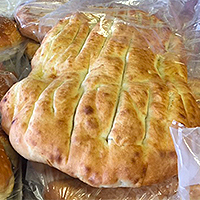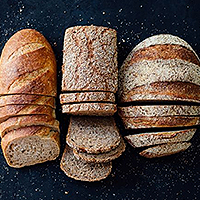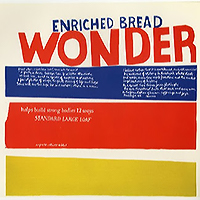 |
BorderLore, February 2017
Kneading hearty and healthful folklife,
creating community at kitchen tables.
Let's share a slice of culture this month. Let's also bake our daily bread -- be it brown, white, flat, leavened, sweet, savory, fried, or baked -- in symbolic practice that's medicine as well as folk art and tradition. It may vary by community, yet the act is a universal reminder of how food melds cultural ritual together with nourishment of body and spirit.
Bread has migrated to new worlds through many ethnic kitchens, providing comfort in strange places and a retained connection with ancestral homelands. The iconic power of its symbolism began in ancient times: The Egyptian god Osiris, referenced in mythologies of farming, agriculture and grain, is pictured with spikes of wheat growing from his body, symbolizing resurrection. In Greek imagery, the Olympic goddess Demeter is pictured with wheat and is associated with the bounty of harvest. The Old Testament's references to manna are among the many essential metaphors linking bread to biblical signs of thanksgiving, hospitality and redemption. In the cycle of life, death and rebirth, the Grim Reaper's scythe not only harvests grain, but souls for the afterlife. In colonial America, there's an economic and ethnic connection to bread-baking, which provided colonists with a way to transfer their knowledge of European foodway traditions. By the mid-1700s, for example, flour accounted for half of the total value of Pennsylvania exports, with influence beyond the regional cultures that used large outdoor ovens for their pretzel, ginger cookie and bread-baking. Bread as inheritance is certainly a most relevant traditional symbol that is treasured and timeless.
This month's Borderlore reflects on several familiar layers kneaded into the discourse of local folklife:
|

Borderlore meets with the owner of Za'atar Mediterranean Restaurant to discuss the bread-baking traditions from Iraq and the Middle East, here.
|
Bread offerings may be rites of theater as well as life. Local puppet makers Matt Cotten and Susan Furr speak to the folkart, activism and storytelling legacies that are part of puppetry performance, here.
|
Mardi Gras is a day of opulent celebration. BorderLore explores the tradition of the colorful and glazed King Cake pastry, with Tucson resident Lisa O'Neill who grew up on King Cake, here.
|

The February Roundup of resources, news and events, is here. |
There's a beloved cultural bounty found in many family cookbooks. Tucked among the pages are worn bread recipe cards and photos, telling stories and inspiring memories of the "bread broken" around kitchen tables that join families with community. It's a matter of celebration, a tasty harmony between life and work. Importantly, it demonstrates that there's always room for a personal twist or two in the recipe...as there is in life.
Remember to break bread often. As possible, do it in the company of others and in behalf of a shared community experience.
Bread as Music:
As we go marching, marching / In the beauty of the day/
A million darkened kitchens / A thousand mill lofts grey/
...Hearts starve as well as bodies/
Give us our bread, but give us roses/
...Bread & roses, bread & roses!
(Fry)Bread as Activism:
The food's complicated significance was highlighted in 2005,
when Indian writer and activist Suzan Shown Harjo
led a crusade against frybread in the newspaper Indian Country Today.
"Frybread is emblematic of the long trails from home
and freedom to confinement and rations..."

Bread as Art "Anything as important and central to life as bread
soon rises to the top of the vocabulary chain..."
Bread as Bible:
Old man Moses must be dead;
Children in the wilderness crying for bread.
|
STAY CONNECTED  
|
|
|
|
|